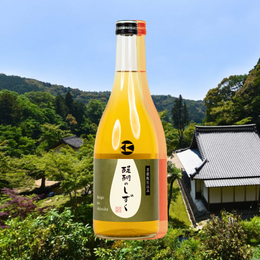
Nose, a town in Osaka and not the organ you smell with, is home to a quiet craft sake brewery with something of a growing cult following. Akishika Shuzo was set up back in 1886 and is nestled amongst rice paddies and bamboo forests, right between the cultural hubs of Kyoto and Osaka in the Kansai region.
The sixth-generation and current boss, Hiroaki Oku, is credited for taking the brewery in a pretty interesting direction. Under his leadership, the brewery became a pioneer in junmaishu or junmai sake - that's “pure rice” sake made without any additives – which is a bit of a break from what other postwar Japanese breweries were doing. By 2009, the brewery became one of the rare few sake breweries that purely produce junmai sakes.
Another key feature of Akishika Shuzo is its commitment to self-sustainability, especially in terms of rice production. They live by the motto "From our own fields to bottle." The brewery owns 22 hectres of land used for biodynamically grown rice, steering clear of pesticides and herbicides, and even making their own fertiliser from the byproducts of rice growing and sake brewing (such as sake lees). Hiroaki-san also deliberately avoids the use of animal manure as fertiliser because he couldn’t be sure that the animals were given high-quality food. This approach, known as "ikkan-zukuri," or from seedling to sake, is a testament to Oku-san's commitment to quality.


Unsurprisingly, this single-minded focus on quality comes at the price of yield. But that’s precisely what Hiroaki-san expects. In fact, when he took over the family brewery in 2009, the new production target he set was to cut down sake production by a whopping 75 percent – all in a bid to ensure sure every batch is top-notch.

Despite the small production volume, the brewery produces a rather wide range of different sakes with different names. There’s the Mizore Moyo, a variant of cloudy nigori-style sakes. There’s the Kuro Moheji that is made from rice specifically harvested from a single paddy field. There’s also the very complex Triple Eight or 888, which refers to a sake made from a rare strain of yeast numbered #8, with 80% rice polishing ratio and made from Hattan Nishiki rice (8 in Japanese is pronounced ‘Ha’).
For this review, we’ll be tasting the Akishika Shuzo Tasanshu. The term Tasanshu (高酸) means “high acidity”. This is a result of the use of a specific strain of #28 yeast. Let’s give this a taste.
Akishika Shuzo, Tasanshu Junmai Sake (秋鹿酒造 高酸度純米酒), 15% ABV – Review
70% polishing ratio, nama genshu (unpasteurised and undiluted), muroka (non-charcoal filtered), organic hattan nishiki rice

Nose: Quite straightforward and clean, dominated by briny and salty notes, and combined with a rather distinct mineral chalky character.
Palate: Surprisingly flavourful and vibrant. It's sweet and sour in the most juicy way, reminiscent of ripe citrus fruits, especially pomelo. The sweetness is nuanced, revealing hints of ripe melon and a very subtle honey-like quality, all balanced beautifully by the acidity. Adding depth to the profile is an umami that is akin to the savoury richness of grilled unagi (eel).
Finish: Clean and brief, with the citrus and umami flavours gently subsiding.

My Thoughts:
Many drinks producers might emphasise their traditional methods and high-quality production in their marketing stories, but not all actually translate this into exceptional products. Judging by this Tasanshu, Akishika Shuzo really seems to be doing something different.
This is a fairly straightforward but very flavourful sake, and despite a 70% polishing ratio, it maintains a very nice clarity. The balance between the sweet, sour, and umami notes is most masterfully achieved This deserves 8/10 stars – enjoy this with a meal or just have it on its own – it’s super satisfying.
My Rating: 8/10
|
Score/Rating Scale :
|
Kanpai!

@CharsiuCharlie







